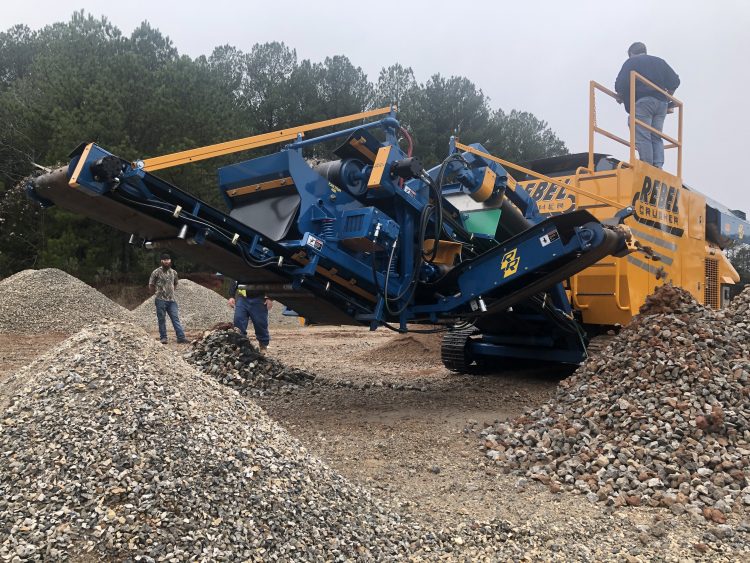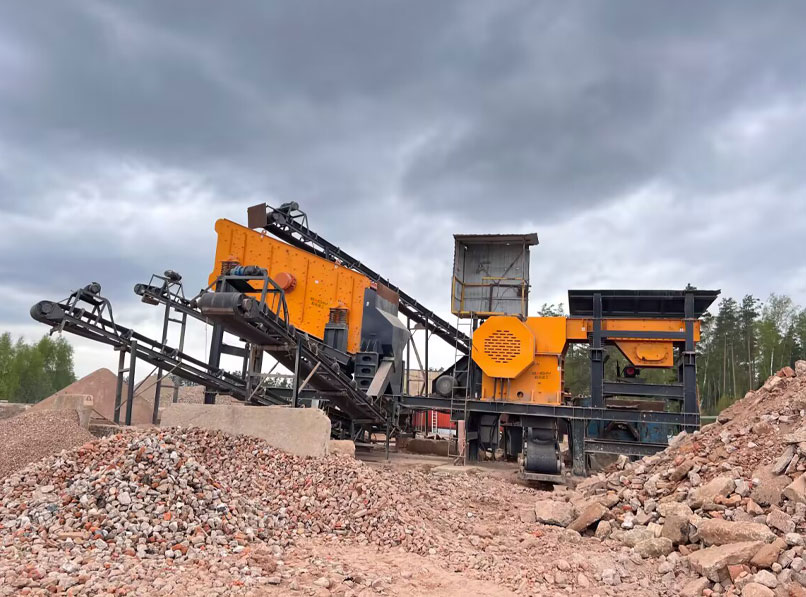Concrete Crushing Proficiency: The Art of Selecting Concrete Crusher for Sale
Concrete Crushing Proficiency: The Art of Selecting Concrete Crusher for Sale
Blog Article
Optimizing Sustainability: The Role of Concrete Crushers in Recycling
Concrete waste is a prevalent environmental problem, with the building industry being among the largest contributors to international carbon discharges. Amidst this obstacle lies an appealing remedy: the role of concrete crushers in recycling. These cutting-edge machines have arised as a key player in maximizing sustainability by transforming disposed of concrete right into valuable resources. By taking advantage of the power of sophisticated technology, concrete crushers use a myriad of advantages that not only decrease waste yet additionally conserve natural deposits and alleviate the ecological impact of construction jobs. In this conversation, we will certainly discover just how concrete crushers work, highlight the advantages of recycling concrete, showcase effective instance researches, and provide a glimpse into the future of this progressing area. Join us as we untangle the untapped potential of concrete crushers, and discover the path in the direction of a greener and more sustainable future.
The Ecological Effect of Concrete Waste
The environmental influence of concrete waste is a significant problem in the world of recycling and lasting building and construction methods. Concrete is one of one of the most commonly used building and construction products due to its toughness and longevity. Its production and disposal add to different environmental problems. The extraction of basic materials, such as limestone and clay, for concrete manufacturing causes habitat devastation and biodiversity loss. Additionally, the production process itself is energy-intensive and releases a considerable amount of carbon dioxide right into the environment, adding to climate adjustment.
The disposal of concrete waste additionally poses environmental challenges. When concrete is demolished or eliminated from building websites, it is commonly sent out to land fills, occupying valuable space and producing greenhouse gas discharges as it breaks down. The incorrect disposal of concrete waste can pollute soil and water sources, impacting ecosystems and human health.
To address these ecological problems, reusing concrete waste has ended up being a vital method in the construction industry. Concrete crushers play a crucial duty in this procedure by breaking down concrete waste into smaller sized, multiple-use bits. These crushed particles can after that be utilized as aggregates in new concrete manufacturing, lowering the requirement for virgin materials. Recycling concrete waste not just preserves natural deposits but also reduces carbon discharges related to concrete production.
Exactly How Concrete Crushers Job
Concrete crushers are powerful machines created to break down concrete waste right into smaller bits for recycling functions. These machines make use of hydraulic pressure and big jaws to apply force on concrete waste, squashing it into smaller sized pieces that can be recycled as accumulations in brand-new construction jobs.
The procedure of exactly how concrete crushers function begins with the feeding of the concrete waste into the crusher's receptacle. The hopper, which is generally furnished with a shaking feeder, guarantees a regular and also flow of product right into the crusher.
Once inside the crusher, the concrete waste goes through the squashing action of the device's jaws. These jaws, which are commonly made of durable and strong products like manganese steel, apply remarkable force on the concrete waste, simplifying right into smaller, much more workable items.
The smashed concrete waste then goes through a collection of filters or displays, which arrange the aggregate by size (concrete crusher for sale). This allows for the separation of bigger items that might require further crushing from smaller, ready-to-use aggregates

Advantages of Recycling Concrete With Crushers
Recycling concrete waste with the help of crushers offers various benefits towards lasting building and construction techniques and source conservation. One of the essential benefits of recycling concrete is that it assists minimize the demand for brand-new building and construction products.
An additional significant benefit of reusing concrete is the decrease in land fill waste. By recycling concrete, we can divert this waste from landfills and decrease the pressure on these already restricted resources.
Moreover, using recycled concrete can bring about cost financial savings in construction jobs. Squashed concrete is often less costly than using brand-new internet materials, making it an eye-catching option for designers and specialists. Recycling concrete can also contribute to LEED (Leadership in Energy and Environmental Style) qualification, which is an extensively identified standard for sustainable building practices.
Case Research Studies: Successful Concrete Recycling Projects
A number of significant instance researches exhibit the success of concrete reusing tasks in numerous building and construction and framework growths. One such study is the Central Artery/Tunnel Task, additionally called the "Large Dig," in Boston, Massachusetts. The task entailed the building and construction of a brand-new underground highway system, which required the demolition of existing concrete structures. By implementing a concrete crusher on-site, the task had the ability to reuse and reuse roughly 98% of the destroyed concrete, causing significant cost financial savings and lowered ecological effect.
Another effective study is the Sydney City Northwest job in Australia. This significant facilities development entailed the building of a brand-new metro railway. To minimize the project's carbon impact best site and promote sustainability, concrete crushers were made use of to recycle the knocked down concrete from old buildings and frameworks. This method not just saved land fill area yet likewise caused considerable product cost savings and lowered transportation expenses.
On top of that, the Los Angeles International Flight Terminal (LAX) development project integrated concrete recycling as a vital component of its sustainability efforts. By making use of crushers to process and reuse the knocked down concrete, the task had the ability to divert hundreds of lots of waste from land fills and lower the need for virgin aggregate. This not just minimized environmental effect yet additionally helped the job accomplish LEED qualification.
These case research studies show the performance of concrete crushers in optimizing sustainability and advertising the circular economic climate in building and construction and framework projects. By embracing concrete recycling, developers can decrease waste, save sources, and add to a much more lasting future.
Future Technologies in Concrete Crushing Modern Technology

One of the future innovations in concrete crushing modern technology is the growth of robot crushers. These crushers will be geared up with advanced sensing units and expert system abilities, allowing them to autonomously identify and divide different materials in knocked down concrete. This will dramatically minimize the requirement for manual sorting, conserving time and resources.
Another location of advancement is the use of advanced squashing methods that can extract a greater portion of aggregates from knocked down concrete. Currently, a significant quantity of aggregates are shed during the crushing procedure. With the growth of new squashing innovations, it is prepared for that the healing price of aggregates will boost, leading to a much more sustainable and effective recycling procedure.
Furthermore, scientists are checking out making use of alternate power sources to power concrete crushers. By utilizing sustainable energy, such as solar or wind power, the carbon impact of the crushing process can be more decreased, adding to a greener and more sustainable building and construction market.
Final Thought
In conclusion, concrete crushers play a vital duty in making best use of sustainability through the recycling of concrete waste. By reducing the environmental impact of concrete waste and promoting the reuse of products, crushers add to an extra lasting building and construction sector.
Concrete crushers play a critical duty in this procedure by damaging down concrete waste into smaller, reusable particles. Reusing concrete waste not just preserves all-natural resources but also reduces carbon emissions linked with concrete manufacturing.
By carrying out a concrete crusher on-site, the job was able to recycle and reuse about 98% of the knocked down concrete, resulting in substantial expense financial savings and reduced ecological influence.
To minimize the project's carbon footprint and advertise sustainability, concrete crushers were utilized to recycle the knocked down concrete from old structures and structures (concrete crusher for sale).In conclusion, concrete crushers play a critical duty in optimizing sustainability with the recycling of concrete waste
Report this page